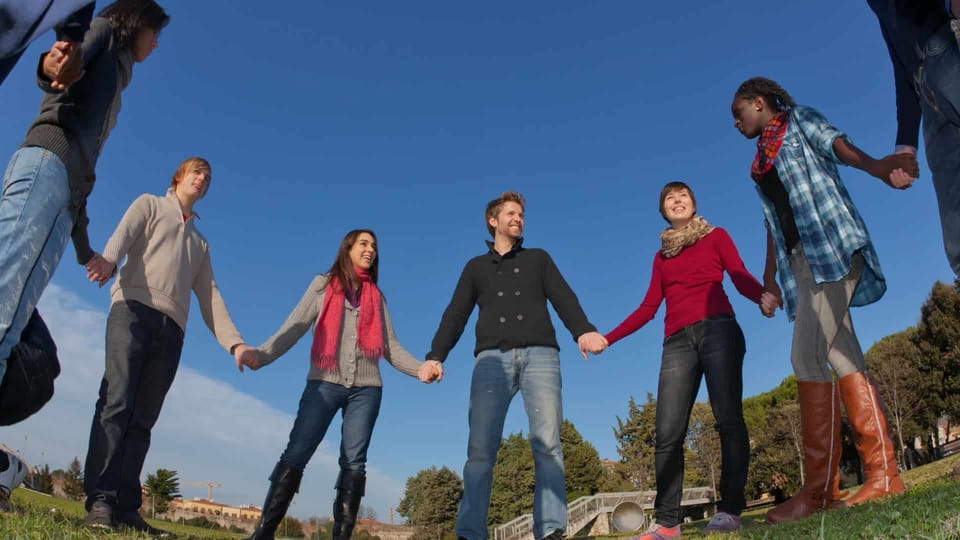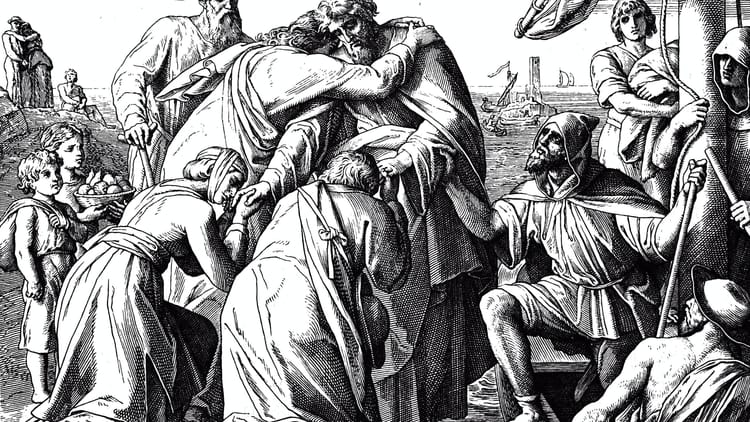Maximum Church (Acts 2:42-47)

Big Idea: Jesus transforms how we live together in ways that go against our natural inclinations and our culture, so that we go from minimum to maximum church.
Gracepoint Church is a church in Berkeley, California. It’s just a block away from the campus of the University of California Berkeley. They began as a group of university students who read about the early church in Acts 2 and wondered if they could replicate that dynamic in a very different context.
They discovered that college life is a perfect place to live out some of those dynamics, because they lived in tiny dorms, because of shared experiences like cramming for midterms, and drinking energy drinks and snacks late into the night. They bonded over their common identity as students. They shared life together, and they saw God move.
When they graduated, they figured that this phase of life was over, and that they would move on to their jobs and careers. But then some of them asked: why does this have to end?
What if instead of scattering to chase the American dream, we continue to live in community just like we did in college? What if we continue to live close enough to borrow sugar or milk or even a meal?… What if instead of thinking about my future and my spiritual aspirations, we thought about our future, of what we could build together for the kingdom of God? And that’s what we decided to do.
When they started working, they didn’t let career and income get in the way of staying together, so they decided to keep their lives simple. It was hard. It meant sometimes pushing back against the dream of a higher paying job or the bigger home, but they stuck together. They stuck to God’s Word, and they stuck to meeting together in each other’s homes. Over the next two decades, they grew as more graduating students decided to stick around.
They began expanding to other ministries and other campuses, with 10–12 people throwing their lots in with each other and moving to the next church planting destination. They would pack up their belongings, look for new jobs, and relocate their families together.
They believe that the college campus is filled with unspoken assumptions about how to live life, how to have fun, how to deal with stress, and that none of those involve pursuing Christ. What would it look like for a group of people to choose a different set of assumptions that would allow them to live together on mission and make a difference with their lives?
Our Context
Their context was the university campus, where you enjoy life together for a short time before being yanked away by other pressures to get on with the rest of your life. They’ve taken the radical step of breaking that pattern with a vision of a different set of values shaped by the kingdom of God.
We live in a different context. We're not very near a college campus. But we have some similarities. We live in relatively proximity. Most of us walk here. We have the opportunity to create something pretty unique while we’re here: to live in a community where we get to meet people on the way to Metro to buy groceries, and for our lives to intersect each other’s. That is pretty cool. This is not common everywhere. It’s one of the things I love about living in Liberty Village.
But we also face a set of pressures that pull us apart: for one thing, the high cost of living here, and the fact that there’s nothing really keeping us here when things get hard. The result is that 70% of the people who live in Liberty Village move within two years.
The question that Gracepoint posed is just as relevant here as it is in their context: What if instead of thinking about my future and my spiritual aspirations, we thought about our future, of what we could build together for the kingdom of God? What if we challenged the unspoken assumptions about how to live life, how to have fun, and how to deal with stress in a way that put Jesus and his mission first?
I want to think about that for a few minutes. What would it look like for an Acts 2 church to thrive in a place like Liberty Village? What would it look like for the biblical vision of church to become stronger than the forces that would cause us to move?
The Vision of Acts 2
In Acts 2, Luke records what the early church looked like.
First, a word about this passage. It’s possible to define the church by the minimum it should be. This would ask, “What is the least that we can get away with and still call ourselves a biblical church?” That’s a valid question, and would include things like “baptized believers who meet regularly to worship God through Jesus Christ, to be exhorted from the Word of God, and to celebrate the Lord’s Supper under the guidance of duly appointed leaders” (John Piper). That’s the minimum of what a church should be.
I don’t know about you, but I’m not interested in being a minimum church. Liberty Village doesn’t need a minimum kind of church. John Piper says, “Churches are dying today because they are not doing anything which the world should look at and say: ‘There is evidence that God is real and that he is glorious.’” The question is: what kind of church would convince Liberty Village that God is real and that he is glorious, far more glorious than chasing our careers and dreams of the good life?
In the passage we just read, the believers’ commitment to God transformed the lives of the followers of Jesus in very specific ways. These four shifts define what it looks like to follow Jesus beyond the minimum. It gives us a pattern of what the church should be. It shows us what it looks like “to live the totality of our lives for the sake of Christ, no matter what the cost may be” (Derek Thomas).
Verses 42 to 47 describe some of the shifts that happen when Jesus transforms how we live together. All four shifts are radically different from the way we’d normally live in Liberty Village. He moves us:
From living as we choose to submitting to God’s Word
Ever since the beginning, we’ve wanted to decide what’s right for us. A couple of weeks ago, someone gave me their ethical grid for making decisions: it has to make you happy. If you want a more sophisticated ethical grid, Jonathan Haidt says we take other factors into account too: things like liberty, harm, and fairness.
What happens when Jesus transforms how we live? We stop deciding what is right for ourselves, and we sit together to submit to God’s Word. What God says is right. We do what we’re doing right now: we open God’s Word to hear what God says, and then we obey. We become hungry for God’s Word. It’s becoming what someone calls a Word-Centered Church: believing that “God’s Word, working through God’s Spirit, is God’s primary instrument for growing God’s church.”
From independence to sharing a common life together
Acts 2:42 mentions fellowship. Fellowship is such a flaccid word. The word fellowship actually means to share in common with. It’s a picture of a common life. I’m used to an independent life: I have my stuff. I choose how I get to live. Acts 2 pictures a very different kind of life: we don’t live alone. We live a common life together with other believers that extends to our resources.
We get a picture of what fellowship looks like in verses 44-45:
And all who believed were together and had all things in common. And they were selling their possessions and belongings and distributing the proceeds to all, as any had need.
People still had their own stuff, but their lives were marked by generosity and sharing.
Imagine being so defined by our common identity as followers of Jesus so that our common life meant more to us than our individual lives, not out of obligation but out of joy. Tertullian described what this looked like around 200 A.D.:
Contributions are voluntary, and proportionate to each one’s income. They are used to support and bury poor people, to supply the wants of boys and girls who are destitute of means and parents, and of old people, now confined to the house, and such as have suffered shipwreck, or any who are in the mines, or banished to the islands, or shut up in prison for their fidelity to God’s church.
Jesus moves us from living independently as we choose to submitting to God’s Word and sharing a common life together, but that’s not all.
From eating alone to eating together
Most groups back then ate together as they do now. Many associations met for communal meals only once a month, though. Contrast that with the church in Acts 2: they ate together daily. One commentator says, “Eating together—the potluck supper!—was an important part of church life. The first Christians needed times to talk, discuss, and learn from each other.”
In a recent article in The Atlantic, David Brooks writes, “For decades we have been eating at smaller and smaller tables, with fewer and fewer kin. It’s time to find ways to bring back the big tables.” That’s exactly what Acts describes: a move away from eating alone to bringing back big tables with lots of kin in Christ.
From relying on ourselves to relying on God
That’s what Luke describes when he talks about them praying. Darrell Bock writes, “A community at prayer is something Luke emphasizes about community life. It seeks God’s direction and is dependent upon God because God’s family of people do not work by feelings or intuition but by actively submitting themselves to the Lord’s direction.” Praying together is a way of entering into deeper relationships with each other:
Corporate prayer is an opportunity to enter into the trials and griefs of others, even if it’s just for a moment. Or it could be that we do feel grief and loss, but the prayers are all full of joy and confidence. Prayer is an opportunity to rejoice with others, even when we don’t feel the same emotions. Corporate prayer is a way to practice the basic empathy of the Christian life: “Rejoice with those who rejoice, weep with those who weep” (Romans 12:15). (John Starke)
What does Jesus do when he gets ahold of us? He moves us:
- From living as we choose to submitting to God’s Word
- From independence to sharing a common life together
- From eating alone to eating together
- From relying on ourselves to relying on God
This is what moving beyond minimum church looks like. All of this is a consequence of Jesus getting hold of our hearts. We can’t do this alone. But when we are transformed by Jesus, when we’re forgiven, transformed, and made new through his death and resurrection, then this is how we can and must live.
And the result is found in verse 47: “And the Lord added to their number day by day those who were being saved.” Living this way ripples out to others who say, ‘There is evidence that God is real and that he is glorious.”
Getting Practical
Everything is pulling us to the left. Everything — including cultural forces and the desire to live the good life, with unspoken assumptions about what the good life is — is pushing us to the left, to minimum church. To move to the right is countercultural — but it’s also the path to being a church that’s shaped by Jesus and that impacts our community.
John Stott writes, “Luke’s summaries present an ideal for the Christian community which it must always strive for, constantly return to, and discover anew, if it is to have the unity of the spirit and purpose essential for an effective witness.”
So what does it look like to strive for, return to, and discover anew this pattern for church? As usual, please go to our Rule of Life page to submit your ideas. Here are two of mine.
- Look for ways to lean into community. A lot of what Luke describes can’t be programmed. It’s just life together. If you look at the back at our values banner, you’ll notice that it says that we aspire to be a relational church. We’re all about relationships with God and others. What does this look like? It looks like telling others what’s really going on in your life, going out for dinner after church, inviting people over to our place, getting together regularly and in both planned and spontaneous ways. It looks like bigger tables with more kin. Everything is pushing us to a more isolated life; Jesus is calling us to a more connected life with each other. So let’s lean into that.
- Consider staying. The church in Berkeley said, “What if instead of scattering to chase the American dream, we continue to live in community? What if we continue to live close enough to borrow sugar or milk or even a meal?…What if instead of thinking about my future and my spiritual aspirations, we thought about our future, of what we could build together for the kingdom of God? And that’s what we decided to do.” And it’s what I want you to consider as well. What if instead of moving like everybody else, you made a long-term commitment to this place and these people for Jesus’ name?
The last idea — stability — was mentioned in the rule of St. Benedict: the rule of stability. It means staying put, even when it gets ordinary, even when it would be easier to leave. I wonder if it’s time to consider this for ourselves.
Jesus transforms how we live together in ways that go against our natural inclinations and our culture, so that we go from minimum to maximum church. What could he be calling you to do?
Father, we live in a culture that pushes us to chase our dreams, to move to bigger houses, to prioritize our goals even at the expense of community and church. But Jesus transforms us so that we go against our natural inclinations and culture and pursue life together. As you did in Acts 2, and as you are doing in Berkeley, do so here. Help us to resist the pull of culture and our natural inclinations and live in community and build something together for the kingdom of God. In Jesus’ name. Amen.





